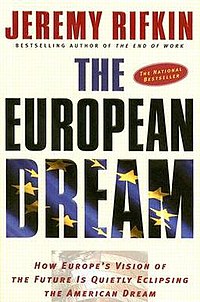European Dream

Hardcover edition
|
|
| Author | Jeremy Rifkin |
|---|---|
| Country | United States |
| Language | English |
| Subject | Evolution of the European Union |
| Genre | Non-fiction |
| Publisher | Jeremy P. Tarcher Inc. |
|
Publication date
|
August 19, 2004 |
| Media type | Print (hardcover, paperback) |
| Pages | 448 pp. |
| ISBN | |
The European Dream: How Europe's Vision of the Future Is Quietly Eclipsing the American Dream is a book, by Jeremy Rifkin published on August 19, 2004 by Jeremy P. Tarcher Inc. Rifkin describes the emergence and evolution of the European Union over the past five decades, as well as key differences between European and American values. He argues that the European Union, which he describes as the first truly postmodern governing body, is already an economic superpower rivaling the U.S., and has the potential to become a full world superpower.
According to Rifkin, the "European Dream" is one in which individuals find security not through individual accumulation of wealth, but through connectivity and respect for human rights. Rifkin's concept of connectivity is displayed in the Dutch people's quest for gezelligheid (meaning a cozy, inclusive environment), as well as the social market theories that have dominated French and German economic planning since WWII. Rifkin argues that this model is better-suited to 21st-century challenges than the "American Dream".
Rifkin explains Europe's opposition to the death penalty in a historical context; after losing so many lives to wars in the early and mid-20th century, Europe is opposed to state-sponsored killing as a matter of principle. He also discusses the European commitment to "deep play" — a notion which he claims is absent in the United States.
To support his thesis, Rifkin notes that in addition to the European Union having more people and a greater Gross Domestic Product than the U.S., the potential of the EU as an economic superpower is shown by having: 14/20 of the top banks in the world, 61 of the 140 of the top companies of the world as measure by the Global Fortune 500 (the U.S. has 50), a homicide rate that is 1/4 than in the U.S., the 18 most developed countries in Europe all have more broadly distributed wealth than the U.S. (the U.S. ranks 24th in the world), higher lifespan than the U.S., higher literacy rates than the U.S., and higher quality of life than the U.S. Also, Europeans provide 47% of all the humanitarian aid in the world, and are seen by Rifkin as being more effective in global economic market regulation, evidenced by the fact that the EU stopped the merger of General Electric and Honeywell, fined Microsoft for anti-trust, and blocked genetically modified food despite U.S. opposition.
...
Wikipedia
